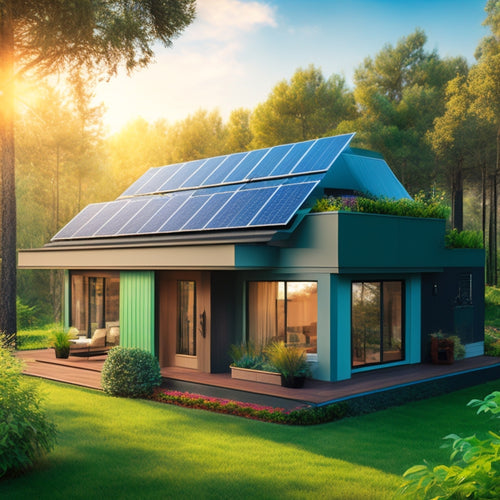
Solar Homes: Maximizing Greywater for Energy Efficiency
Share
By integrating solar power with greywater systems, you can reduce your reliance on the grid by up to 70% and achieve significant energy savings. Greywater, collected from sinks, showers, and washing machines, can be treated and reused for irrigation and toilet flushing, reducing water waste and minimizing exposure to harmful chemicals and pathogens. Regular maintenance is essential to guarantee the safe and efficient operation of the system. As you investigate the benefits of greywater recycling and solar-powered treatment, you'll uncover even more opportunities to enhance energy efficiency and grid independence, and take a step closer to a more sustainable home.
Key Takeaways
- Integrating solar power with greywater systems reduces grid reliance by up to 70%, leading to significant cost savings and energy efficiency.
- Proper design and installation of greywater systems minimize maintenance and enhance reuse, optimizing energy efficiency in solar homes.
- Implementing rainwater harvesting and greywater reuse strategies reduces overall water demand, maximizing greywater's potential for energy efficiency.
- Low-flow fixtures, drought-resistant landscaping, and natural treatment processes reduce energy consumption in greywater systems, supporting sustainable living.
- Conducting energy audits and cost analyses helps prioritize upgrades, ensuring that solar homes maximize greywater's energy-saving potential and achieve long-term savings.
Understanding Greywater Systems
What exactly is greywater, and how does it factor into a water-efficient system? Greywater refers to the wastewater generated from sinks, showers, and washing machines - fundamentally, all non-toilet water.
You can utilize this significant resource by collecting and reusing it for irrigation and flushing toilets. Identifying greywater sources is essential; you'll need to determine which fixtures and appliances can be connected to your greywater system.
Additionally, integrating renewable energy solutions, such as solar panels, can further reduce your carbon footprint and energy costs. By utilizing hybrid electric solutions, you can also lower emissions and improve fuel efficiency.
System maintenance is also important; regular checks will guarantee your system operates efficiently and safely. You'll need to take into account factors like water quality, storage capacity, and distribution methods to create a reliable and effective greywater system.
Benefits of Greywater Recycling
By implementing a greywater recycling system, you can reap numerous benefits that extend beyond water conservation.
You'll enjoy significant health benefits by reducing your exposure to chemicals and pathogens found in traditional water sources.
Greywater recycling also minimizes environmental impact by decreasing wastewater generation and the amount of pollutants released into ecosystems.
Additionally, you'll experience cost savings through reduced water bills and lower energy consumption.
By integrating renewable energy sources, such as solar energy, you can further enhance energy efficiency and reduce your reliance on the grid.
Regular maintenance, including cleaning, is essential for peak performance.
When maneuvering through regulatory considerations, be aware of local permits and guidelines.
Although installation challenges may arise, proper maintenance tips, such as regular inspections and cleaning, will guarantee peak performance.
Community initiatives and technology advancements are further driving the adoption of greywater recycling, making it an attractive option for those seeking freedom from water scarcity.
Solar-Powered Greywater Treatment
Make use of the power of solar energy to propel your greywater treatment system forward.
By leveraging solar energy, you can power advanced treatment technologies that provide superior water filtration. This approach enables seamless system integration, reducing your environmental impact while increasing energy efficiency.
Integrating solar power can reduce grid reliance by up to 70% renewable energy integration, leading to significant cost savings and enhancing energy independence from external sources.
Regular maintenance practices are essential to guarantee peak system performance and regulatory compliance. Conduct a thorough cost analysis to determine the feasibility of solar-powered greywater treatment for your specific situation.
By doing so, you'll be able to make an informed decision that aligns with your values and goals.
With solar energy driving your greywater treatment, you'll be one step closer to achieving energy independence and a more sustainable lifestyle.
Greywater Storage and Reuse
Optimizing greywater storage and reuse systems is essential to utilizing the full potential of this precious resource.
You'll want to select storage solutions that are durable, resistant to corrosion, and can withstand outdoor conditions. Consider using tanks made from materials like polyethylene or concrete, which are non-reactive and won't contaminate your greywater.
Effective greywater filtration is also vital to remove contaminants and sediment that can clog your system. You can install filters with varying porosity levels to capture different sizes of particulate matter.
Integrating energy-efficient solutions, such as solar-powered systems, can further reduce your carbon footprint and energy costs. By leveraging fast charging infrastructure, you can also power your greywater system with renewable energy.
Regular maintenance, like cleaning your filters and checking your storage tanks, will guarantee your system runs efficiently and effectively.
Implementing Greywater Systems
With regards to your property's unique terrain and water needs, you'll need to assess various factors before implementing a greywater system.
Consider the water-generating appliances, such as showers and sinks, and the distance to the irrigation area. This will help determine the ideal system size and piping layout.
Make sure regulatory compliance by researching local ordinances and permits required for greywater systems.
Additionally, integrating renewable energy sources solar-powered fast charging can further enhance energy efficiency and reduce your carbon footprint.
Proper system design and installation are vital for efficient water reuse and minimizing maintenance.
Regular system maintenance is essential to prevent clogs, corrosion, and contamination.
Optimizing Energy Efficiency
As you optimize energy efficiency in your greywater system, you'll want to focus on water conservation strategies that minimize wastewater generation and reduce the energy needed to treat and reuse greywater.
A well-designed greywater system can also provide opportunities to reduce energy consumption by leveraging natural treatment processes and integrating with other sustainable systems.
Water Conservation Strategies
How can you maximize greywater's energy-saving potential? By implementing water conservation strategies that reduce your overall water demand, you can optimize greywater's ability to offset energy consumption.
One effective approach is rainwater harvesting, which collects and stores precipitation for non-potable uses like toilet flushing and irrigation.
Drought resistant landscaping is another key strategy, as it minimizes water usage for outdoor spaces.
Additionally, installing low-flow showerheads and toilets can greatly reduce your water footprint.
Greywater System Design
By reducing your water demand through conservation strategies, you've set the stage for a greywater system that can maximize its energy-saving potential.
Now, it's essential to design a system that efficiently collects, treats, and reuses greywater. A well-designed system will incorporate greywater filtration to remove contaminants and sediment, guaranteeing the water is safe for irrigation and flushing toilets.
You'll also need to take into account system maintenance, including regular filter cleaning and inspections, to prevent clogs and guarantee the system operates at peak efficiency.
A properly designed greywater system won't only reduce your energy consumption but also provide a reliable source of water for your environment and household needs, giving you the freedom to live more sustainably.
Energy Saving Opportunities
Frequently, homeowners overlook the energy-intensive processes involved in treating and pumping potable water, but a well-designed greywater system can considerably reduce this energy burden.
By integrating greywater into your solar home, you can optimize energy efficiency and enjoy significant cost savings. Conducting energy audits and cost analysis will help you identify areas of improvement and prioritize upgrades.
For instance, you can install energy-efficient pumps and optimize your greywater system's hydraulic design to minimize energy consumption. Additionally, consider implementing rainwater harvesting and greywater reuse strategies to reduce your reliance on potable water.
Frequently Asked Questions
Can I Use Greywater for Irrigation During Heavy Rainfall?
You can definitely use greywater for irrigation during heavy rainfall, but be cautious not to overwhelm your soil; instead, adopt smart greywater recycling and irrigation strategies to guarantee efficient water reuse and minimize environmental impact.
How Often Should I Inspect My Greywater System?
You should inspect your greywater system regularly, ideally every 3-6 months, to confirm compliance with greywater regulations and identify opportunities for system upgrades, assuring peak performance and eco-friendliness.
Are Greywater Systems Suitable for Small Households?
As you ponder the possibility of utilizing greywater, you wonder: can your small household reap the benefits? The answer is yes, greywater systems are suitable for small households, offering a unique opportunity to conserve resources and reduce your eco-footprint.
Can I Connect My Greywater System to Existing Plumbing?
You'll need to check local greywater regulations before connecting your system to existing plumbing, guaranteeing compatibility and compliance; consult a professional to avoid costly mistakes and secure a seamless, eco-friendly integration.
Do Greywater Systems Require Special Maintenance Training?
You'll need to understand greywater regulations to guarantee system sustainability; while maintenance is relatively simple, you'll still require training to maneuver local codes, properly inspect your system, and make adjustments for ideal performance and environmental harmony.
Related Posts
-

Sustainable Scrubbing: Top Bathroom Solutions for Earth-Conscious Homes
You're taking an important step towards creating a more sustainable home by switching to eco-friendly bathroom cleani...
-

3 Green HVAC Filters for Solar-Powered Homes
When outfitting your solar-powered home with an HVAC system, you'll want to choose filters that align with your commi...
-

What Are Natural Clay Paints for Green Home Interiors?
You're about to uncover a game-changing alternative to synthetic paints that not only enhances the aesthetic of your ...


